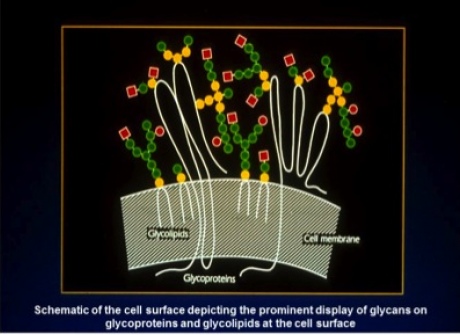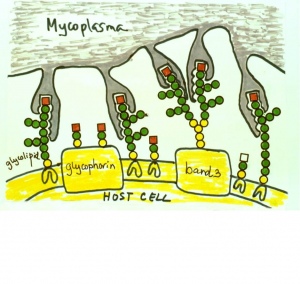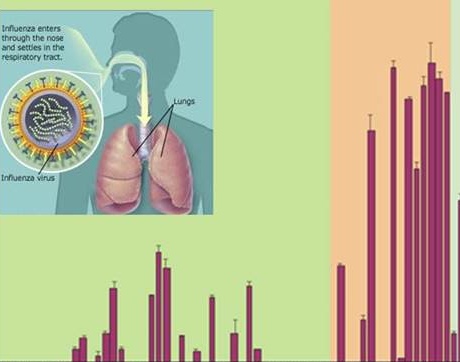Professor Ten Feizi wins Society for Glycobiology lifetime achievement award

After winning her prestigious award, Professor Ten Feizi has been looking back on her career exploring the sugar-chain forests that cover our cells.
Professor Feizi is a pioneer of glycobiology, which looks at the biological roles of sugar chains, or glycans. When the term ‘glycobiology’ was first coined in the 1980s she was already well-established in the field.
My mission in life is to find out precisely what these glycans are doing
– Professor Ten Feizi
Director of Glycosciences Laboratory
She has now been awarded the Rosalind Kornfeld Award for Lifetime Achievement in Glycobiology to commemorate her contributions “both to transformational methodology and to the conceptual framework of the field”. Although she admits there are huge challenges in studying the range and complexity of glycans, she clearly finds the work exhilarating and has developed a fondness for the tricky sugar chains she has spent much of her life chasing.

“My mission in life is to find out precisely what these glycans are doing,” she says. “They are so intricate - like forests of different types of trees decorating the surface of cells - and have such great structural diversity that it is completely unimaginable all this detail has no function. At one time, biologists considered glycans to be a nuisance because they added to the complexity of proteins they were working on, but now, as the body of research grows, we are showing that glycans are playing important roles in many biological processes and that, directly or indirectly, they are involved in every major disease.”
 Professor Feizi is Director of the Glycosciences Laboratory in the Department of Medicine at Imperial College London, but she started her professional career as a clinical doctor with only a passing interest in lab work. It was a postdoctoral Cyprus fellowship she held at Hammersmith Hospital, in the Department of Haematology, that led her to a research career to explore the world of glycans.
Professor Feizi is Director of the Glycosciences Laboratory in the Department of Medicine at Imperial College London, but she started her professional career as a clinical doctor with only a passing interest in lab work. It was a postdoctoral Cyprus fellowship she held at Hammersmith Hospital, in the Department of Haematology, that led her to a research career to explore the world of glycans.
"I was interested in studying blood diseases such as thalassaemia, which are common in my home country of Cyprus, but then I began to hone in on atypical pneumonia. This is caused by a mycoplasma (Mycoplasma pneumoniae), which is a type of bacterium,” she explains. “I was fascinated to learn that about 30 per cent of patients with atypical pneumonia develop cold agglutinins in their blood, which are basically auto-antibodies (or misdirected antibodies) that bind to the surface of the patients’ own red blood cells. The antigen on red cells that was bound by these antibodies had a name, “I” antigen, but its structure was unknown. I was intrigued by these antibodies which cause clumping of the patients’ own red cells, and sometimes anaemia, and I decided to take some time to explore this condition further. This turned out to be a point of no return in my career.”
Professor Feizi returned to the Royal Free Hospital, where she had done her medical studies, and she started her work to understand why the mycoplasma infection triggers the production of auto-antibodies to red blood cells. She showed that the mycoplasma, when it binds to human red cells can stimulate the production of the auto-antibodies. She moved to Rockefeller University in New York in 1968, where she learnt from Professor Richard Krause how to extract carbohydrates; and having isolated a substance that the red cell antibodies bound to, she collaborated with Professor Elvin A Kabat at Columbia Medical Center on analysis of the glycans, allowing her to become a specialist in the field.

Drawing by Professor Feizi showing Mycoplasma binding to glycans on a host cell
Professor Feizi returned to UK in 1973, establishing a research group focused on glycobiology at the Medical Research Council’s Clinical Research Centre. She collaborated also with Professor Sen-itiroh Hakomori from Seattle to work out the details of the carbohydrate structure of the “I” antigen. She later revisited the relationship between the “I” antigen and the mycoplasma, and demonstrated that the receptor for the mycoplasma on the red cell surface is the “I” antigen capped with the sugar molecule known as sialic acid. Thus auto-antibodies are directed to the glycan receptor.
Although there have been many achievements in her career, Professor Feizi cites her papers in the early 1980s as being among her academic highlights. Here she demonstrated that marked changes occur in glycans during embryonic development, cell differentiation and in cancer, and that the addition or deletion of one sugar molecule on a glycan have pronounced effects and can decide whether a protein or a microbe, such as the mycoplasma, can bind to a cell or not.
"I came up with the metaphor of post codes or area codes to describe the important biological roles that glycans play,” she explains. “Carbohydrate-binding proteins or lectins were ideal candidates as postmen, and the glycans on cells would provide directional information. If a sugar molecule was added or removed, then the instructions would change."
In a paper in Nature in 1985, she predicted involvement of glycans in cell growth, differentiation and diseases such as cancer. She then set her sights on proving these predictions.
It was during this time, and in the course of many labour-intensive experiments measuring the binding properties of individual glycans, that Professor Feizi realised there was a need for an efficient technology to analyse many glycans simultaneously. This motivated her to develop the neoglycolipid (NGL) system that has become so vital to glycobiology, allowing binding experiments to be carried out with a large number of glycans at the same time.
“Unlike DNA or proteins, glycans can’t be cloned or expressed, which makes research in this area very difficult. They have to be isolated from natural sources or synthesized chemically, and there are relatively few facilities that can do these.

Microarray analysis showing binding of the 2009 pandemic flu virus to glycans
Professor Feizi moved to Imperial in 1994 and the first glycan microarray system (based on the NGL principle) was introduced by her group in 2002. The microarray technology has contributed immensely to advances in glycobiology and improved our understanding of the roles of glycans. It has helped to unravel the interactions between proteins and glycans in health and disease processes, providing important insights, for example, into the mechanisms involved in parasitic infections, the 2009 pandemic flu, HIV and cancer.
“Our carbohydrate microarray facility at Imperial, supported by Wellcome Trust, is one of only two facilities in the world that have a sufficiently large library of glycans that have been sequenced and categorised such that they can be used as ‘probes’ in microarrays for screening analyses offered to the scientific community to identify glycans bound by diverse proteins. It is currently the most diverse.”
Talking about the Rosalind Kornfeld award, Professor Feizi says: "It is a huge compliment and it naturally makes me appreciate all my colleagues, without whom I couldn’t have achieved all I have. It is a very interactive field and I particularly enjoy our wide range of collaborations. It’s like a jigsaw puzzle where we are all fitting the pieces together but this is a very tricky jigsaw puzzle and it’s not going to be quick to complete!”
It’s like following a trail: almost every day, we find something new and revealing and biologically relevant. And there is still so much more to discover!
– Professor Ten Feizi
Director of Glycosciences Laboratory
Professor Feizi is now based at the Hammersmith campus next to the hospital which led her to embark on her research career. She may have geographically come full circle, but it’s clear she intends to continue exploring the world of glycans for the foreseeable future. "Throughout my research career I have felt like an explorer with this desire to discover. It’s like following a trail: almost every day, we find something new and revealing and biologically relevant. And there is still so much more to discover!”
Professor Feizi will receive the Rosalind Kornfeld award for Lifetime Achievement in Glycobiology at the Joint Meeting of the Society for Glycobiology and the Japanese Society of Carbohydrate Research in Honolulu, Hawaii on 16 to 19 November 2014.
The Imperial College London Glycosciences Laboratory has been supported by a succession of research grants from the Medical Research Council, the Biotechnology and Biological Sciences Research Council (BBSRC), UK Research Councils’ Basic Technology Initiative, Leukaemia and Lymphoma Research, the Wellcome Trust and the US National Cancer Institute (NCI) Alliance of Glycobiologists
Article supporters
Article text (excluding photos or graphics) © Imperial College London.
Photos and graphics subject to third party copyright used with permission or © Imperial College London.
Reporter
Franca Davenport
Communications and Public Affairs